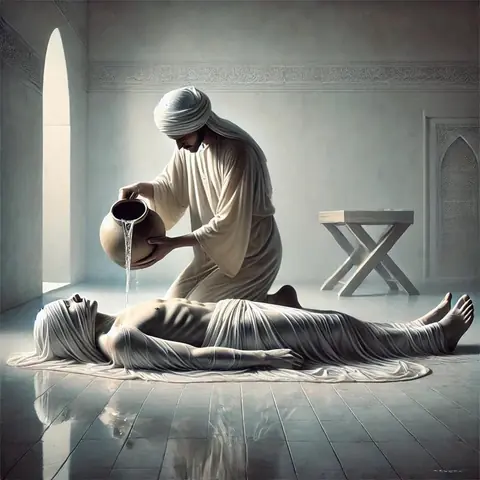Among the strangest and most profound experiences a person might undergo is standing at the threshold of death - not merely as one mourning a loss, but as a participant in the final farewell: performing the ritual washing of the deceased.
In Islamic culture, this is far more than a physical task or a legal religious duty. It is a silent journey beyond the visible world, where one confronts the raw truth of life, death, spirit, and body - the ultimate destiny awaiting us all.
A Sacred Duty, Deeper Than We Imagine
In Islamic law (sharia), washing the dead (ghusl al-mayyit) is classified as a communal obligation (fard kifayah): meaning if some members of the community perform it, the rest are absolved from sin.
This ritual is considered an essential part of honoring a deceased Muslim. The body is washed at least three times - or more if necessary with careful attention to purity, modesty, and reverence.
However, what religious texts do not always reveal are the profound emotional and spiritual experiences lived by those who undertake this task. Each body tells a different story; each moment carries unique, often indescribable feelings.
Behind the Closed Doors: Mysterious Experiences
Many who perform the washing of the dead have shared strange and deeply moving stories, often kept private out of respect and awe.
One of the most renowned figures in this field, Sheikh Abbas Batawi, spoke of cases where sweet fragrances filled the air without explanation, or faces of the deceased shone with a peace and light far beyond earthly description—despite the person’s suffering during life.
A Moroccan washerwoman once recounted an encounter where, after completing the washing of an elderly woman, she felt an invisible hand gently kiss her forehead. Unable to explain it, she broke down in tears.
Other accounts describe bodies that resisted being turned toward the qibla (the sacred direction facing Mecca) or exhibited unsettling signs that left everyone in the room stunned.
Signs of a "Good End"? Or Natural Phenomena ?
In Islamic tradition, events such as a fragrant scent, a smiling face, or bodily calmness are sometimes interpreted as signs of a blessed death (husn al-khatimah). Conversely, unpleasant odors or bodily disfigurement may be seen as troubling signs.
However, religious scholars and medical experts caution against jumping to spiritual conclusions too quickly.
Many of these phenomena are natural physiological processes that occur after death, including:
- Decomposition caused by bacteria, releasing strong-smelling compounds like cadaverine and putrescine.
- Skin discoloration due to blood pooling (livor mortis).
- Swelling of the body from gas buildup.
- Changes in facial features due to the cessation of blood circulation.
- Odors linked to chronic diseases (like liver or kidney failure) rather than any spiritual state.
Thus, not every unusual occurrence should be immediately linked to moral or spiritual interpretations.
Washing the Body... and Touching Deeper Meanings
Those who perform this sacred act are not merely cleansing a body; they are immersed—often unconsciously - in a deeply spiritual experience.
They treat the body as a trust (amanah), preparing it carefully for burial by washing, purifying, and shrouding it.
This ritual reflects humility, peace, and hope.
Through it, washers are reminded of human frailty and the transient nature of worldly life.
Fear may mingle with awe, sadness with serenity but all who engage in this work agree: it is a purification of the soul, not just of the body.
The Final Lesson: We Are All Travelers
The ritual washing of the dead is not merely a religious practice; it is a profound existential moment that distills the entire story of human existence into a few simple, sacred steps.
From those silent rooms, we realize: the body we labor for all our lives will one day return to a simple white shroud.
And the greatest words that might be spoken about us after we pass would be:
"He was washed and buried. Pray for his mercy."
In that moment, only good deeds, a righteous reputation, and the prayers of others remain.
Are we ready ?
Perhaps we must rethink how we live, reorder our priorities, and never forget amid the rush of daily life… that one day, someone else will wash us too.
Let that day be the beginning of a beautiful eternity - not a regretful ending.







No comments:
Post a Comment